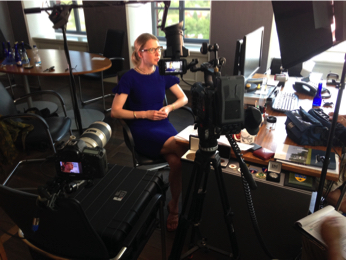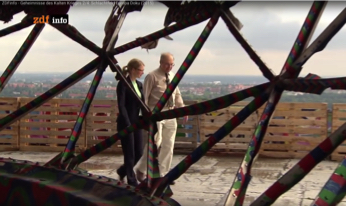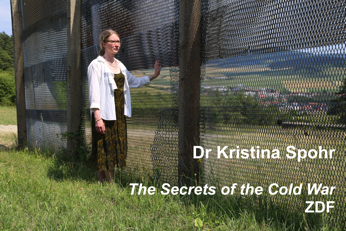Transcending the Cold War reviewed in the German press
One of Dr Kristina Spohr’s newest books, Transcending the Cold War (co-edited with Professor David Reynolds), was reviewed by Professor Bernd Greiner in the German national newspaper Sueddeutsche Zeitung on 18 December 2016. Greiner says that, with Transcending the Cold War, published by Oxford University Press in 2016, Kristina Spohr and David Reynolds have not simply published an intelligent and "cleverly composed" history book on statecraft and Cold War summitry between 1970 and 1990. "Even more", he continues, "it is a commentary on the political blind flight of our days. Or a contemporary appeal." Read Greiner’s full review here (in German). See also another post by Greiner about Transcending the Cold War written for the Berlin Center for Cold War Studies blog (in German).

“International History at its best” - Diplomacy & Statecraft 4 (2016) on The Global Chancellor
T. G. Otte, Professor of Diplomatic, International and Military History at University of East Anglia, reviewed Dr Kristina Spohr’s The Global Chancellor (OUP 2016) for the latest issue of Diplomacy & Statecraft (vol. 27, issue 4, 2016). This is the first major study in English of Schmidt's foreign policy and its intellectual roots. It shows Schmidt as a 'global chancellor', engaging with major world leaders. Otte praised Spohr for her “thoughtful and cogently argued reassessment of Schmidt”, which “raises profound questions about the role of individuals in international politics in general as well as about Schmidt’s posthumous standing.” The Global Chancellor, so Otte says is “a little gem; it is international history at its best. It leaves one asking for more.” Read the full review here (paid subscription). LSE users may read the full review for free.

Der Weltkanzler in the German press
Dr Kristina Spohr's latest book continues to receive the attention of the German press. Helmut Schmidt: Der Weltkanzler – the extended German edition of the The Global Chancellor published earlier this year by OUP - centres around Helmut Schmidt’s foreign policy and its intellectual roots. On 4 November 2016, the German newspaper Darmstädter Echo covered an evening lecture in Darmstadt, where Dr Spohr introduced her book to a large audience. (Read about the event in “Strong Voice in the Concert of the Great Powers” - in German). On 10 November, she was interviewed by the main publication of the Social Democratic Party of Germany, the monthly paper Vorwärts. In her interview, which showcases Der Weltkanzler, Dr Spohr claims that chancellor Schmidt's central role in world politics has so far tended to be ignored in Germany. (Read the interview in German: "Helmut Schmidt Was More than just a Doer"). A point reiterated in Dr Spohr's interview for the German weekly news magazine, Focus, on 19 November, where she argues that contrary to what the German people might think, he was more than just a "doer" and a "crisis manager". He was a “strategic thinker” and a major international player in 1970s and 1980s who, against the odds, brought the divided semi-sovereign West Germany back to the top table in world politics. A true "global chancellor" or “Weltkanzler” - read the interview (in German).

Dr Kristina Spohr discusses Transcending the Cold War at Berlin Centre
Dr Kristina Spohr was at the Berlin Centre for Cold War Studies in Germany, on 16 November 2016 to talk about her new edited book, Transcending the Cold War: Summits, Statecraft and the Dissolution of Bipolarity in Europe, 1970-1990, with Professor David Reynolds (University of Cambridge). The event was co-organised with the Bundeskanzler-Willy-Brandt-Stiftung and centred around a discussion of the evolvement and impact of summits since the 1970s, as well as lessons learned since then. German historian Professor Bernd Greiner gave a short introduction into the book and moderated the discussion. Read more about the event and listen to the podcast (in English).
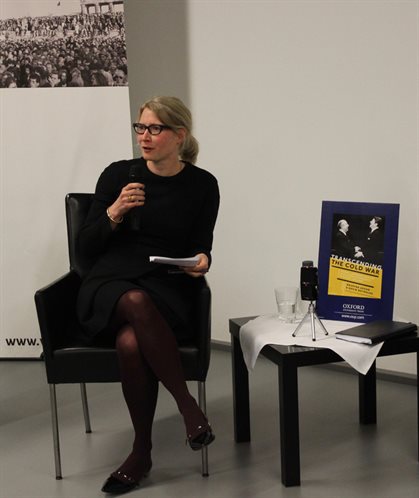
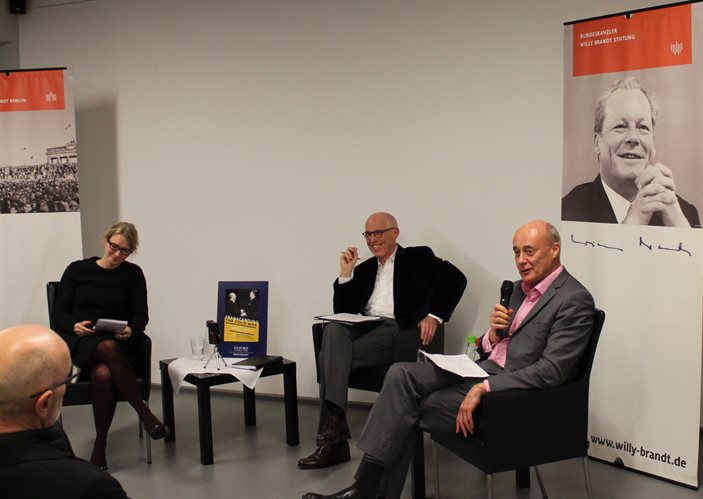

Keynote address speaker at 2016 Helmut Schmidt Journalism Prize
On 10 November, Dr Kristina Spohr gave the keynote address - “Der Weltkanzler – Looking Back” - at the 21st Helmut Schmidt Journalism Prize (sponsored by ING DiBA) award ceremony in Frankfurt. The Helmut Schmidt Journalism Prize has been awarded since 1996 and is an annual commemoration of the best investigative journalism carried out in Germany. This year, the first prize went to Bastian Obermayer, Frederic Obermaier and Vanessa Wormer for their "Panama Papers" series published in the Süddeutschen Zeitung.
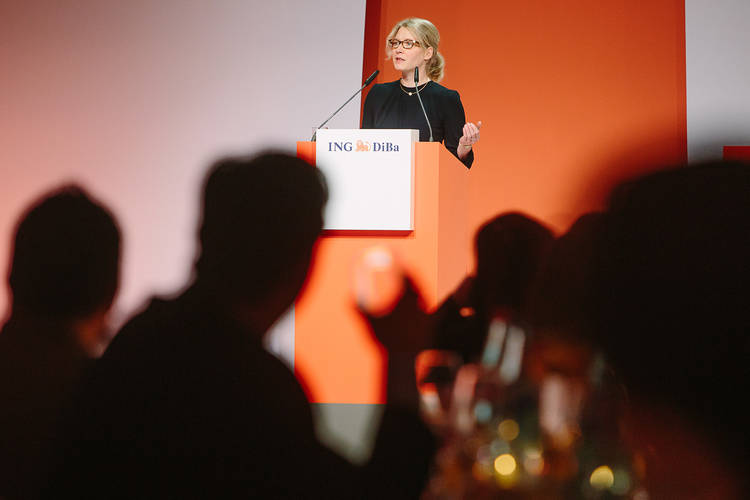
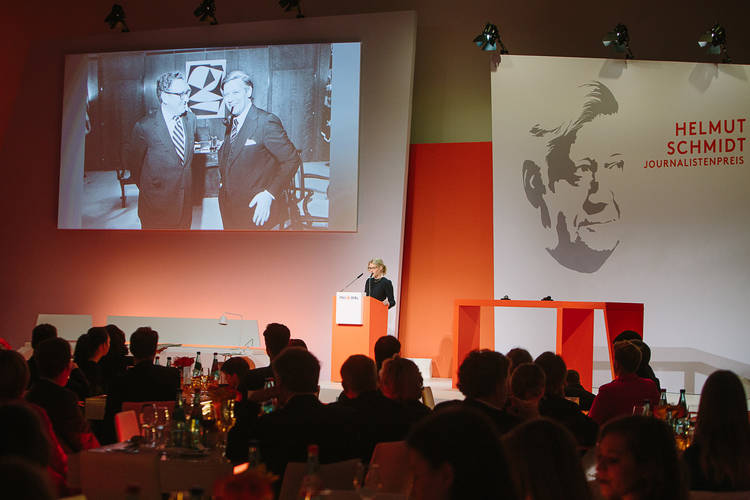
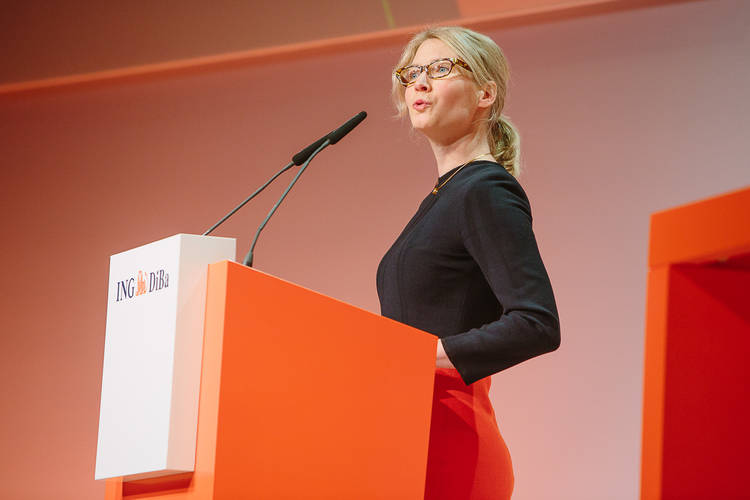
©newsroom.de

Interviewed for ZDF documentary about Helmut Schmidt
Dr Kristina Spohr appeared in the documentary Die zwei Leben des Helmut Schmidt (The Two Lives of Helmut Schmidt), first aired by German TV station ZDF on 6 November 2016. Dr Spohr was one of the interviewees in the ZDF History series and acted as scientific advisor to the programme, produced by film-maker Sonja von Behrens. The documentary explores Helmut Schmidt’s duality.
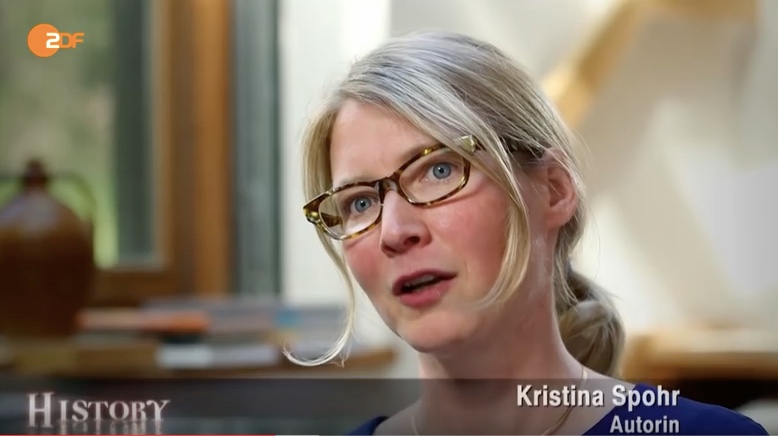
Watch the documentary on ZDF's website (in German).

Top 3 most popular LSE author in The Conversation in October
Dr Kristina Spohr topped the list of most read LSE authors in The Conversation during the month of October. Her contribution to the online publication, “Thirty years on as ‘New Cold War’ Looms, US and Russia Should Remember the Reykjavik Summit”, was the most read article in The Conversation website during the month of October with 6,953 reads, even though it was published online on 19 October. The Conversation is an independent source of news and views, sourced from the academic and research community and delivered direct to the public.

The Global Chancellor nominated Book of the Year 2016
In the November/December 2016 issue of the leading German foreign politics journal, IP (Internationale Politik) – Zeitschrift, under the section, "Book of the Year 2016", two leading figures from German/International politics and media (Niels Annen – foreign policy spokesman of the Social Democrats’ parliamentary party, and Wolfgang Ischinger, Chairman of the Munich Security Conference) have chosen Dr Kristina Spohr’s book, The Global Chancellor: Helmut Schmidt and the Reshaping of the International Order (OUP, 2016), as their book of the year. Annen declares, “seldomly has a historical study been so current as Kristina Spohr’s book on Helmut Schmidt.” Ischinger considers The Global Chancellor a “must read”. Read their full views.

Dr Kristina Spohr and Professor David Reynolds interviewed by Cambridge TV on 30th Anniversary of the Reykjavik Summit
In an interview for Cambridge TV, broadcast on 24 October 2016, Dr Kristina Spohr and Professor David Reynolds (University of Cambridge) challenged the conventional interpretation of the Reykjavik Summit as an historic missed opportunity and argued that Reykjavik helped bring about real commitment to nuclear disarmament. They claimed it was one of several meetings between world leaders that helped bring the Cold War to a peaceful end. Their view is the focus of their new edited book, Transcending the Cold War: Summits, Statecraft, and the Dissolution of Bipolarity in Europe, 1970-1990, released by Oxford University Press in September 2016.
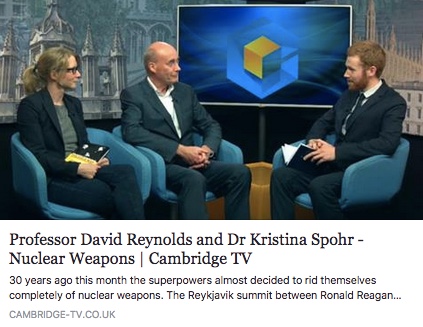
Watch the full interview

On the "New Cold War” and the importance of remembering the Reykjavik Summit thirty years on
Dr Kristina Spohr, our expert on Cold War summitry and the end of the Cold War, contributed an article to The Conversation with Professor David Reynolds (University of Cambridge), called "Thirty years on as ‘new Cold War’ looms, US and Russia should remember the Rekyjavik summit". In their article, Dr Spohr and Professor Reynold suggest a diplomatic solution to the current US-Russian standoff, based on the lessons learned from the era of détente and the end of the Cold War in the 1970s and 1980s. In particular, the role of international statecraft and personal dialogue between leaders. Here, the Reykjavik summit between Ronald Reagan and Mikhail Gorbachev is mentioned, as well as Helmut Schmidt’s “Dialogpolitik”.

Helmut Schmidt: Der Weltkanzler given 5-Star review by KULTURradio/rbb
On 11 October 2016, Dr Kristina Spohr’s latest book, Helmut Schmidt: Der Weltkanzler (Theiss, 2016) was introduced and reviewed by Eckard Stuff for the German radio station, KULTURradio/rbb. In her book, which is an extended German edition of The Global Chancellor published earlier in the year by Oxford University Press, Dr Spohr looks at at Schmidt's foreign policy and examines his role in reshaping the global order during the crisis-ridden 1970s. Mr Stuff gives it a five star review. "The most important finding of the book is that Schmidt succeeded in raising the international importance of the Federal Republic. His successors have profited from it."
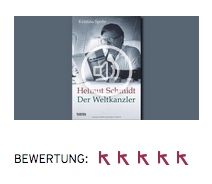
Read and listen to the full review here (in German).

New Statesman
Dr Kristina Spohr contributed an article with Professor David Reynolds (Professor of International History, University of Cambridge) to the New Statesman, Britain's current affairs and politics magazine. The article is titled “Speaking the Unspeakable” and was published on 10 October 2016. In their article, Dr Spohr and Professor Reynolds address the “enormous missed opportunity” that was the Reykjavik summit and the need to revise this negative view of the summit thirty years on. Armed with recently released transcripts of the meetings, as well as other documents from both the Russian and the American archives, the scholars argue that out of the failure of the Reykjavik summit a new order was built. Read the full article for free.

Rheinische Post newspaper
On 23 September, Dr Kristina Spohr was featured in the “Duesseldorf – Talk of the Town” section of the German-speaking Rheinische Post newspaper. In an article, titled “Kristina Spohr Presents Book on Helmut Schmidt”, she talks about the genesis of her newest book, Helmut Schmidt: Der Weltkanzler (an extended German edition of her previously published The Global Chancellor: Helmut Schmidt and the Reshaping of the International Order) as well as her ongoing book tour, which has taken her to several cities, including Hamburg, Munich, Frankfurt, Berlin and Brussels. Read the full article (in German).
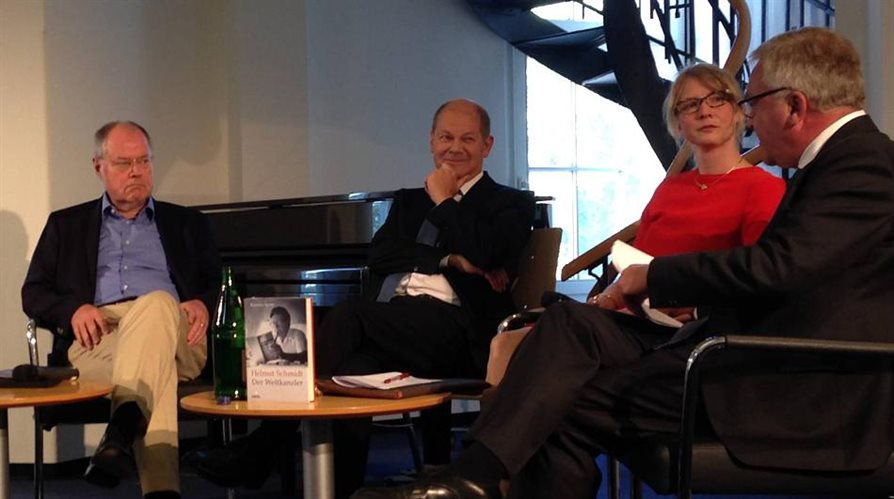
©Theiss Verlag

History Extra Podcast: Cold War Summits
Dr Kristina Spohr and Professor David Reynolds were on History Extra Podcast, the podcast of BBC History Magazine, on 15 September 2016, to discuss their new book about the postwar meetings between international leaders that aimed to control the nuclear arms race. Listen to the podcast. Dr Kristina Spohr and Professor David Reynolds are the editors of Transcending the Cold War: Summits, Statecraft, and the Dissolution of Bipolarity in Europe, 1970-1990 (OUP). The book is the first study on the contribution of summit meetings to the peaceful dénouement of the Cold War. Itanalyses the relationships between the superpowers and their views on arms control, explores their triangular relationship with China, and raises the German question. It is a major multinational study, based on archives from both sides of the 'Iron Curtain'. Purchase the book on Amazon.
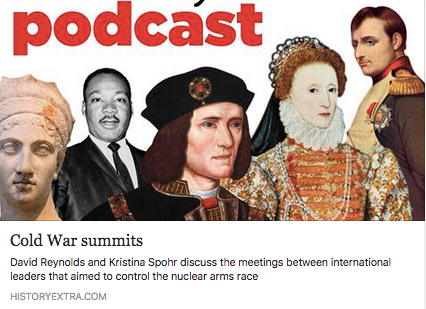
Listen to the podcast

Press coverage of Helmut Schmidt: Der Weltkanzler
Dr Kristina Spohr did the rounds of the German press to introduce her newest book, Helmut Schmidt: Der Weltkanzler (Theiss), to the German public. On 14 September, Dr Spohr was interviewed by the German radio station SWR2 for the programme Journal am Mittag: Kulturgespraeche. Listen to the interview on SWR2 (in German). On the day of the book's release, 15 September, the Hamburger Abendblatt newspaper published a feature piece about her research (incl. in Schmidt’s private archive), and her interpretation of the former Chancellor’s late seventies foreign policy. Read the interview in the Hamburger Abendblatt website (in German and with subscription) or download the article (JPG format).
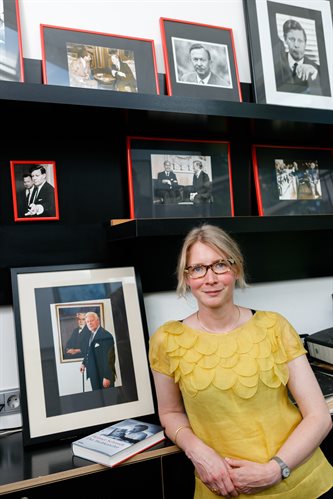
©Marcelo Hernandez/ Hamburger Abendblatt
On the same day, she was also interviewed by the German TV station, SAT 1 Regional (Norddeutschland), on occasion of her book launch, which took place in Hamburg and featured former Federal Finance Minister Peer Steinbrück, former Prime Minister Paavo Lipponen (Finland) and First Mayor of Hamburg, Olaf Scholz. Watch the interview.
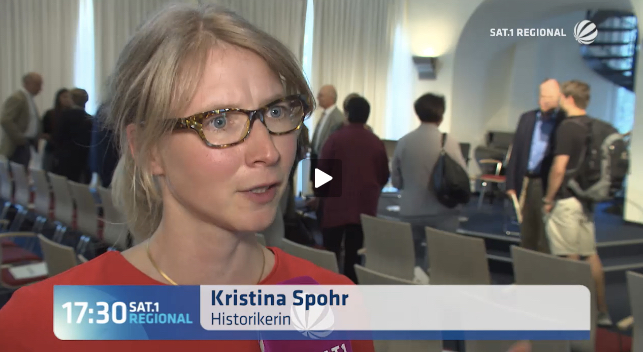
Watch Dr Kristina Spohr on SAT.1 Regional (in German)

Book launch: Helmut Schmidt, Der Weltkanzler, 15 September
Dr Kristina Spohr’s newest book, Helmut Schmidt: Der Weltkanzler, was launched on Thursday, 15 September, in Hamburg. Der Weltkanzler is the extended German edition of her book, Helmut Schmidt: The Global Chancellor, published earlier in the year by the Oxford University Press. The book launch for Der Weltkanzler was organised by the Helmut and Loki Schmidt Foundation in cooperation with Die Zeit and Wissenschaftliche Buchgesellschaft (WBG). The event, fully booked, featured a panel discussion with former Federal Finance Minister Peer Steinbrück and former Prime Minister Paavo Lipponen (Finland). The panel was moderated by Matthias Nass (Die Zeit) and the book was introduced by the First Mayor of Hamburg, Olaf Scholz. See here and read about Der Weltkanzler’s book launch (in German).
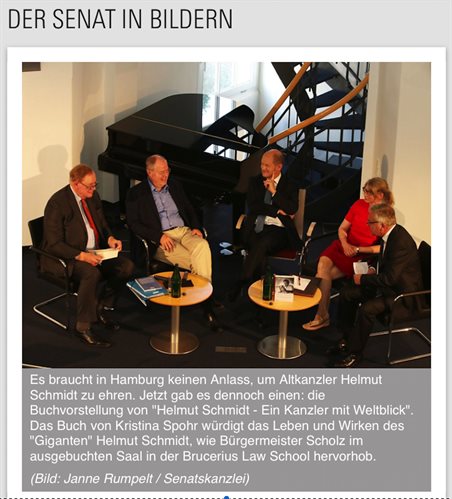

Helmut Schmidt: Der Weltkanzler out now
Dr Kristina Spohr’s latest book, Helmut Schmidt: Der Weltkanzler, published by Theiss Verlag, was released on 15 September 2016. Der Weltkanzler is the extended German edition of The Global Chancellor, published earlier in the year by Oxford University Press. In her book, Dr Spohr portraits Helmut Schmidt and his foreign policy views in the troubled 1970s in a new light. The result is a portrait of a "world Chancellor" who was well versed in global economic and security issues alike. Dr Spohr’s book relies on extensive research conducted in Schmidt's private archives and in numerous archives in Europe and the US. Her argument is supplemented by personal interviews with the former chancellor. It arises from a new and dense political portrait of the Global Chancellor in the context of his time.

Transcending the Cold War: The power of summits
On occasion of their new edited book’s release, Dr Kristina Spohr and Professor David Reynolds (University of Cambridge) contributed a post to the Oxford University Press blog, entitled “When to talk and when to walk”. The post delves on the importance, meaning and historical transformative power of summits and dialogpolitik.“Summitry”, Dr Spohr and Professor Reynolds argue in their post, “involves nerve-wracking judgement-calls for leaders: it requires hard calculations about opportunity, timing and personality – as challenging in the era of Merkel and Putin as in the days of Nixon and Brezhnev or Reagan and Gorbachev. Parleying at the summit is a matter of vision and skill, nerve and guts. Yet for those who are successful there is, perhaps, the chance to become a Maker of History. Here lies the perennial and fateful attraction of summitry.” Dr Spohr and Professor Reynolds new edited book, Transcending the Cold War: Summits, Statecraft, and the Dissolution of Bipolarity in Europe, 1970-1990, was released on 1 September. Purchase the book on Amazon.

Transcending the Cold War for the British Academy podcast
Dr Kristina Spohr and her co-editor, Professor David Reynolds, talked about their new book, Transcending the Cold War: Summits, Statecraft, and the Dissolution of Bipolarity in Europe, 1970-1990 (Oxford University Press, 2016) with Bridget Kendall for the British Academy podcast. The podcast was released on the eve of the book's publication, 1 September 2016. Listen to the podcast podcast. Read more about Transcending the Cold War.

Transcending the Cold War out now
Dr Kristina Spohr’s latest book, Transcending the Cold War: Summits, Statecraft, and the Dissolution of Bipolarity in Europe, 1970–1990, edited with Professor David Reynolds, was published by Oxford University Press on 1 September. As described by OUP, "the manuscript is a major multinational study, based on archives from both sides of the 'Iron Curtain’. It highlights the contribution of international statecraft to the peaceful dissolution of Europe's bipolar order by examining pivotal summit meetings from 1970 to 1990. (...) Written in lively prose, Transcending the Cold War is essential reading for anyone interested not just in modern history but also current international affairs!" Purchase the book here. Transcending the Cold War is Dr Kristina Spohr’s second book published this year. She is also the author of The Global Chancellor: Helmut Schmidt and the Reshaping of the International Order (Oxford University Press, 2016). Its extended German editionHelmut Schmidt: Der Weltkanzler (Theiss) will be coming out soon.

Dr Kristina Spohr interviewed for the Literaturtest blog
On 19 August 2016, in an exclusive interview for the Literaturtest blog, Dr Kristina Spohr answered questions about Helmut Schmidt, the subject of her new book The Global Chancellor (2016, OUP) and its extended German edition, Der Weltkanzler (Theiss Verlag), out on 12 September. She also talked about meeting the former chancellor in person and her view on what Schmidt would think of the Brexit referendum. Read the full interview (in German).

LSE Excellence in Education Award
In June 2016, Dr Kristina Spohr won an LSE Excellence in Education Award. Designed to support the School’s aspiration of creating ‘a culture where excellence in teaching is valued and rewarded on a level with excellence in research’ (LSE Strategy 2020), the Excellence in Education Awards are made, on the recommendations of Heads of Department, to staff who have demonstrated outstanding teaching contribution and educational leadership in their departments.

Leverhulme Trust Research Fellowship
Dr Kristina Spohr has been awarded a one-year Leverhulme Research Fellowship to work on her next book with the working title 'A Conservative Revolution: 1989-1992 in Global Perspective’. This book will offer a fundamental reappraisal of how in 1989-92 the map of Europe was transformed and how the world exited the global Cold War. The project is of real topical urgency because the new international order that emerged after the Soviet Union disintegrated has remained with us to the present day, but is now under serious challenge, especially in Eastern Europe, the Middle East, and East Asia.

Dr Kristina Spohr at the German Embassy to talk about her latest book
At the invitation of the German Ambassador, Dr Peter Ammon, Dr Kristina Spohr was at the German Embassy in London on 12 May 2016 to talk about her book, Helmut Schmidt: The Global Chancellor, with Quentin Peel, former Foreign Editor of the Financial Times. Dr Spohr’s book, published by Oxford University Press earlier this year and can be purchased here. Read more about the event in the German Embassy in London website.
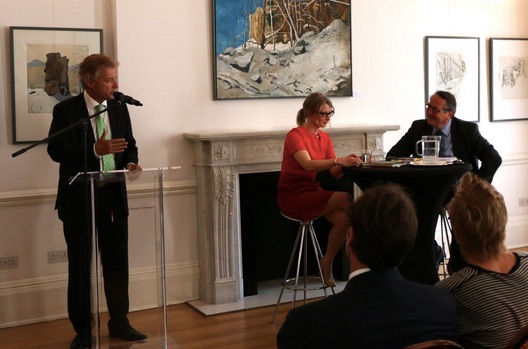
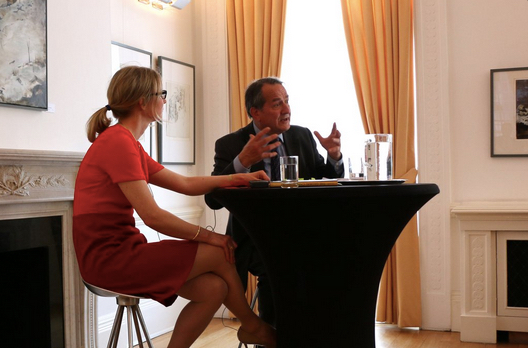
Photo credit: @GermanEmbassy and @eevriviades

Dr Kristina Spohr on the Schmidt-Carter non-relationship in the OUP blog
In an article published by the the Oxford University Press’s blog on 26 April, Dr Kristina Spohr explains how the Schmidt-Carter non-relationship “strained to the limit the bond between West Germany and America”. Her analysis, entitled “A Prickly Pair: Helmut Schmidt and Jimmy Carter”, shows why Schmidt and Carter’s relationship was soured from the beginning, marking an exception in the “chancellor’s modus operandi in international politics, which privileged the importance of reliable ‘political friendships.’” Read her article.

Dr Kristina Spohr on Genscher in the European Politics and Policy LSE blog
On 18 April, Dr Kristina Spohr contributed a post to the EUROPP LSE Blog, called “A reminder of the road not taken: Hans-Dietrich Genscher and the holy grail of a united Europe". In her post, she writes about the career of the late Hans-Dietrich Genscher, West Germany’s longest serving foreign minister and vice-chancellor, his role in unifying Germany, and his ultimate aspiration to integrate both NATO and the Warsaw Pact into an all-European security order that incorporated the Soviet Union. Read the full post.

The Global Chancellor to be published in German
Dr Kristina Spohr’s book, The Global Chancellor: Helmut Schmidt and the Reshaping of the International Order, will be made available in German by Theiss on 15 September 2016. The book will be entitled Helmut Schmidt: Der Weltkanzler. Read more about the German edition in Theiss’s website.
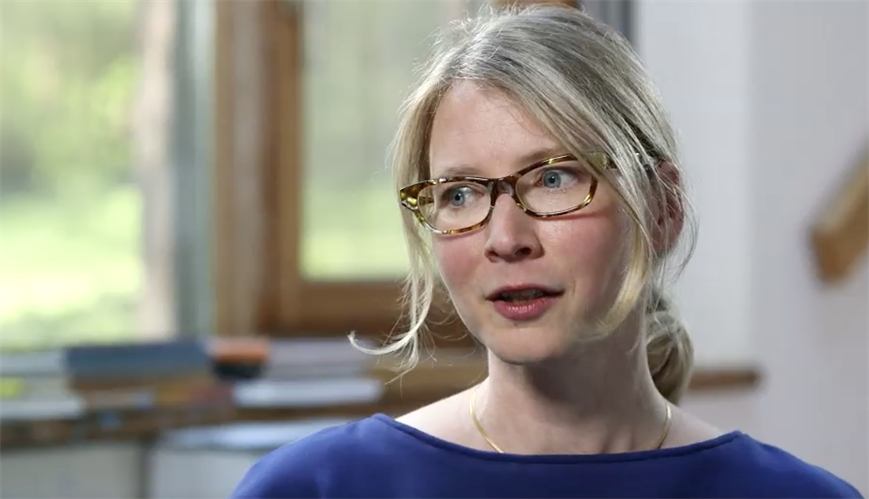
Watch Dr Spohr talking about her book (in German)

Dr Kristina Spohr on Cambridge TV on the late Hans-Dietrich Genscher, German Foreign Minister (1974-1992)
On Friday, 8 April 2016, Dr Kristina Spohr was on Cambridge TV News. She gave a 10-minute long interview on Hans-Dietrich Genscher, the former German Foreign Minister (1974-1992), who passed away on 31 March 2016. Watch the interview.


The Global Chancellor's book launch
Dr Kristina Spohr’s book launch took place on Wednesday, 6 April 2016, at the European Parliament. The event was hosted by the MEPs Jakob von Weizsaecker and Knut Fleckenstein. The Global Chancellor was published by Oxford University Press in March. In her book, Dr Spohr retrieves Chancellor Helmut Schmidt’s true significance as a pivotal figure who helped reshape the global order during the crisis-ridden 1970s. This major reinterpretation, based on detailed research in Schmidt's private papers and numerous archives in Europe and America, reveals him as a leader equally skilled in economics and security, and adept at personal diplomacy, who dared to act as a 'double interpreter' between the superpowers during the nadir of the Cold War. Read more about The Global Chancellor in the OUP's website. Buy the book on Amazon.
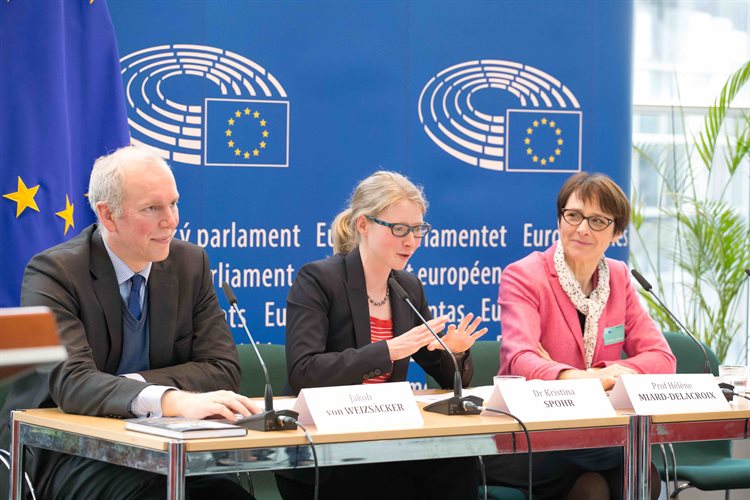

New book: The Global Chancellor
Dr Kristina Spohr’s much anticipated book, The Global Chancellor: Helmut Schmidt and the Reshaping of the International Order, was published on 24 March 2016 by Oxford University Press. Her new book is the first major study in English of Schmidt's foreign policy and its intellectual roots. It shows Schmidt as a 'global chancellor', engaging with major world leaders such as Kissinger. It combines biography, economic history, and security studies. It contributes to current debate on the Cold War and globalization in the 1970s; and it presents a multi-national approach, based on numerous archives in five countries, including Schmidt's own private papers. Read all about The Global Chancellor in the OUP's website. Order it on Amazon.

Meeting Helmut Schmidt
Dr Kristina Spohr has contributed a post to the Oxford University Press Blog (17 March) on "Meeting Helmut Schmidt: The Man Behind the Statesman". Her book, The Global Chancellor, is published by Oxford University Press and comes out on 24 March. In this post, Dr Spohr offers the reader a fascinating glance into her research and the man she places at the centre of her manuscript. Read the full post.

BBC Radio 4
On 16 February 2016, Dr Spohr was on BBC Radio 4's Making History programme. At a time when historians are taking more and more interest in the end of the Cold War, with their research aided by the opening up of archives in the former Eastern Bloc countries, Helen Castor met up with Professor David Reynolds from the University of Cambridge and Dr Kristina Spohr to discuss history of the Cold War. Their new edited book, Transcending the Cold War (OUP) will be published in September 2016. Listen to Dr Kristina Spohr from 07m15s.
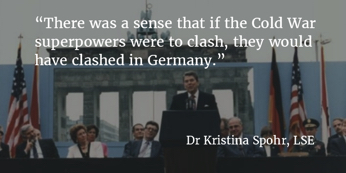

Dr Kristina Spohr co-presents "Secrets of the Cold War" history series on German TV ZDF
Dr Kristina Spohr was a co-presenter in the 5-part TV series 'Secrets of the Cold War’ (Geheimnisse des Kalten Krieges) on the German TV channel ZDFinfo, first aired on 27 and 28 December 2015. Watch part 1, part 2, part 3 and part 4 of the TV series currently available on live stream.
